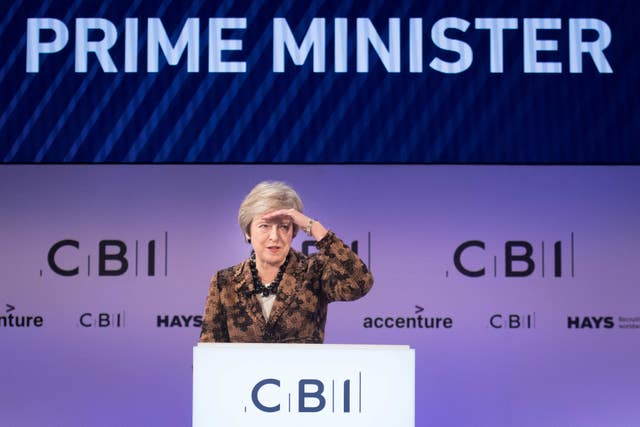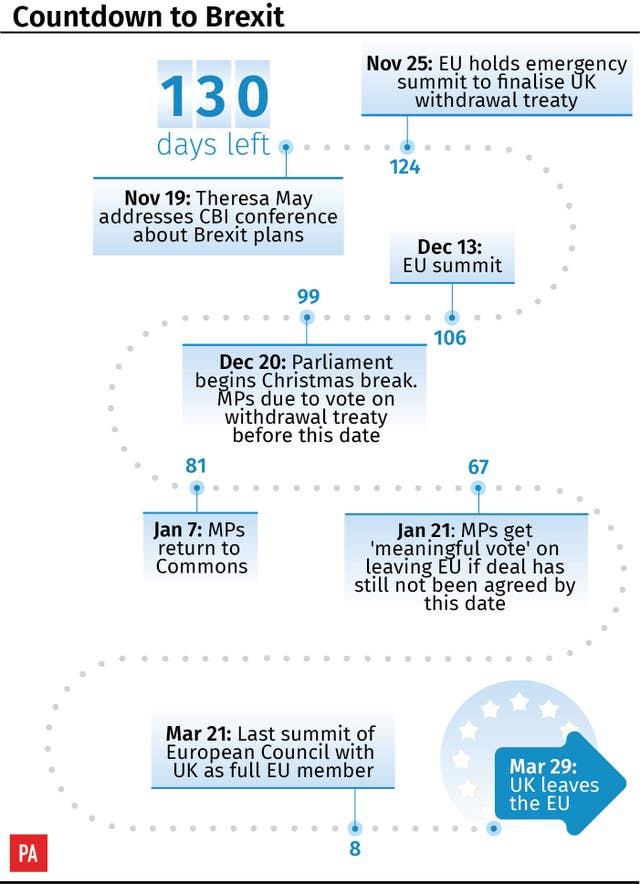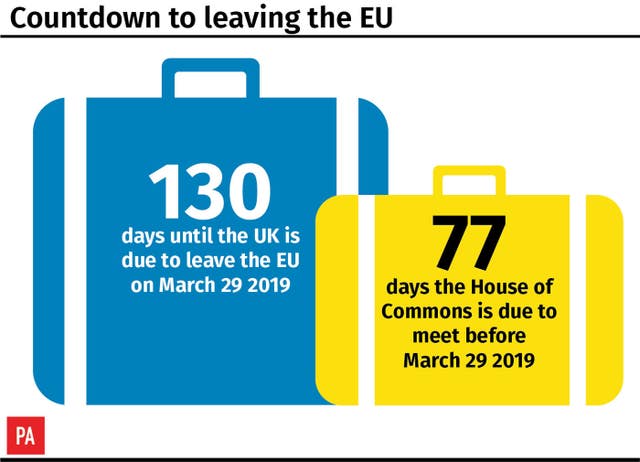May sells her Brexit plan to business leaders as Tory divisions continue
The Prime Minister used a speech to the CBI to insist her Brexit plan will protect jobs and livelihoods.

Theresa May said her Brexit plan was the best for jobs across the country as she battled to keep her own post in Number 10.
In a message to her political rivals, the Prime Minister stressed that Brexit was not an exercise in “political theory” but affected people’s lives and livelihoods.
In Brussels, the European Union’s chief negotiator, Michel Barnier, said the Brexit process was at a “key moment” and urged all sides to remain “calm”.
There has been speculation that a one-off extension, if sought when the agreed transition period expires at the end of 2020, could last until the end of 2022.
But Mrs May said she wanted it to be over by the time of the next scheduled general election in June 2022, while Mr Barnier said an extension could not be “indefinite” and a deadline would be decided in talks this week.
The PM took her Brexit message to the CBI conference as she sought to win business backing for her plans.
CBI director-general Carolyn Fairbairn told the event in east London: “It is a compromise. But it is hard-won progress.”
She said firms were already spending hundreds of millions on preparations for a no-deal Brexit.
In her keynote speech, Mrs May said: “We are not talking about political theory, but the reality of people’s lives and livelihoods. Jobs depend on us getting this right.
“And what we have agreed unashamedly puts our future economic success, and the livelihoods of working families up and down this country, first.”
But Brexit-supporting businessman Roger Kendrick challenged the Prime Minister over her plans, which he said would restrict the ability to strike trade deals with countries outside the EU, telling Mrs May: “Think again about the economics of the whole thing.”
Mrs May told him “the portrayal that you have given of what has been agreed is a little inaccurate” and added: “It makes sense for us to continue having a good trading relationship with the European Union … but also have the freedom, which we will have, to sign those trade deals around the rest of the world.”

Austrian EU minister Gernot Blumel said it was “a painful week in European politics” and “we have the divorce papers on the table, 45 years of difficult marriage are coming to an end”.
Luxembourg’s foreign minister, Jean Asselborn, said: “This deal that is now on the table is the best there is. There is no better deal for this crazy Brexit.”
Asked if he thought Mrs May could survive, Mr Asselborn said: “I believe she can convince her party and perhaps a part of parliament which is not on her side, so that this deal can become reality.”

The message from both the PM and the EU27 representatives in Brussels was that there could be no unpicking of the divorce deal, although work on the blueprint for the future relationship continues.
Mrs May said the withdrawal agreement had been “agreed in full” by both sides.
But former Brexit secretary David Davis said: “This deal is not what the people voted for. It will tie us to the customs union for years to come with no way out.
“But there is still time to negotiate a Canada+++ deal that delivers on the referendum. So let’s get on with it.”
And former foreign secretary Boris Johnson made yet another colourful attack on her plan.
He used a column in Monday’s Telegraph to describe the agreement as a “585-page fig leaf (that) does nothing to cover the embarrassment of our total defeat”.

“There would, of course, be some disruption in that outcome, but by no means as much as sometimes predicted.
“And it is our failure to make proper preparations that has so gravely weakened our negotiations.”
But there was still no certainty over the extent of the revolt against Mrs May’s leadership in the Tory ranks, with speculation continuing over the number of letters calling for a confidence vote submitted to Sir Graham Brady, chairman of the backbench 1922 Committee.
So far, 23 MPs have publicly confirmed that they have sent in letters, with others widely rumoured to have done so, still short of the 48 required to trigger a ballot.





